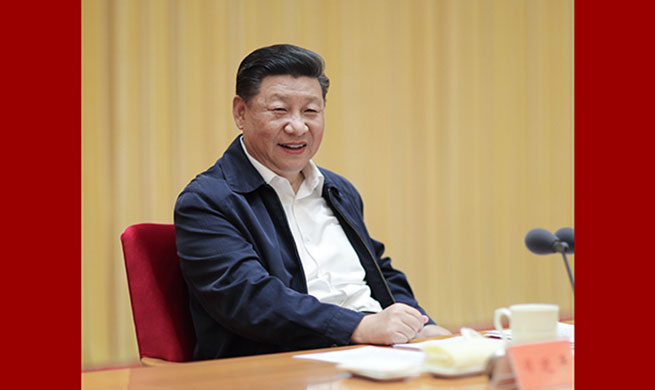by Burak Akinci
ANKARA, Aug. 22 (Xinhua) -- As relations between Turkey and the United States are in a tailspin, Turkish President Recep Tayyip Erdogan's upcoming state visit to Germany in late September could take on even greater significance.
The Turkish leader is expected to visit Berlin on Sept. 28 and 29, where he would meet German President Frank-Walter Steinmeier and possibly Chancellor Angela Merkel to break the ice in bilateral relations which have soured since the coup attempt in Turkey in 2016.
The planned visit, which reportedly includes a military honor guard and state banquet, would be Erdogan's first official visit to Germany after he became president in 2014 and gained more executive powers under new presidential system following the critical elections in June.
ANKARA-BERLIN TIES SOUR
Turkish-German relations took a hard hit following the failed military coup attempt in July 2016. Berlin sharply criticized Ankara's human rights record in the wake of a nationwide crackdown in Turkey against thousands of suspected coup plotters, during which dozens of German citizens were arrested.
Tensions were eased somewhat subsequently after the release of German nationals, including a journalist, Deniz Yucel. Yet Turkey still accuses Germany of harboring followers of the Gulen movement, which Ankara blames for plotting the coup attempt.
Many suspected supporters of the movement, including former diplomats and army officers, have sought asylum in Germany, further irritating the Turkish government.
Experts believe that the Turkish president's visit to Berlin will now present a good opportunity to put bilateral relations back on track and give a boost to fading international confidence in the vulnerable Turkish economy.
"This will be an important visit and the timing is excellent. I hope the currency turmoil hitting Turkey will somehow be dissipated," Mustafa Nail Erkan, an expert on German studies and a professor from the Ankara-based Gazi University, told Xinhua.
The expert explained that Germany would never want Turkey to slide into instability because there are 7,000 active German firms in Turkey, interconnecting both their economies and their investments.
COOPERATION AS MAINSTREAM
The three million Turks in German are also an asset for both countries. Berlin refused Erdogan and his ministers to address the expat community in election campaigns in recent years, increasing bilateral tensions.
"The common enemy is the United States," who is causing bloods to boil in the European Union, in Germany and Turkey by bullying the trade and diplomacy between them, argued Erkan, pointing out that Erdogan's visit to Berlin would reopen dialogues between the two countries which share 250 years of history.
Despite differences among political parties, when it comes to deal with Turkey, Berlin extended a welcoming message to Ankara amid the plunge of the lira, underlining common interests, including the well-being of their bilateral economic relations and their mutual desire to end the war in Syria.
The planned visit would also come at a critical period of Syrian civil war, as the government of Syrian President Bashar al-Assad has regained control over large territories in recent weeks.
Both countries have received many Syrian refugees and an instability in Turkey would give rise to a new inflow of refugees into Europe, said Erkan, adding that maintaining amicable ties was a must for Berlin and Ankara in this context.
In July 2018, Turkey was hosting 3.5 million Syrian refugees, according to figures of the United Nations refugee body.
"No one has an interest in the economic destabilization of Turkey," said Merkel recently, expressing willingness to help Turkey halt the economic chaos.
Turkey is among German's top 20 export markets, before Japan and many European countries. German Economy and Energy Minister Peter Altmaier and his Turkish counterpart Berat Albayrak held phone talks over bilateral cooperation. Altmaier has scheduled to visit Turkey late October with a large delegation to boost economic ties.
While some analysts think that Germany could be a gateway to reset Turkey's ailing and difficult ties with the EU, which have been put into the freezer in the wake of the coup attempt amid mutual distrust, others argue that there is no room there yet for a breakthrough.
NO EU PERSPECTIVE
"I am of those who think that Erdogan's visit to Berlin does not have an EU perspective. This visit is essentially focused on bilateral relations," Serkan Demirtas, a journalist and political analyst, told Xinhua.
"I see this visit as an exercise of putting forward mutual interest in bilateral ties," said Demirtas, emphasizing that "there is common ground mutual will to normalize the (German-Turkish) partnership."
Demirtas also said that there is a willingness on the German side to address some of Turkey's security concerns regarding the Gulen network who has a supporter and financial basis in Germany, irritating Ankara.
Echoing the critical issue, which is at the core of the bad relations between the governments, Alkan argued that "Turkey wasn't successful in explaining how serious the coup attempt and the plotters were, thus Germany was reluctant to fully understand its implications."
"Erdogan would therefore explain Turkey's security concerns directly to the German authorities during his visit," he added.

















